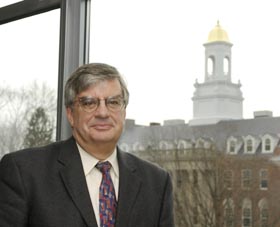|
This is an archived article.
For the latest news, go to the Advance
Homepage
For more archives, go to the Advance Archive/Search Page. |
||
|
Coping With Change A Fact Of Life
For Dean Of Largest College By Karen A. Grava
The students in his college, for example, often don't have a clear idea - at least as freshmen - what their major will be. And many don't know what career path they will take, even after they select a major.
The budget for the college, like that of other schools and colleges in the University, has been uncertain from year to year - a situation that looks set to continue, perhaps even worsen, given the state's current economic challenges. And each of the many departments in the college is evolving since, like nearly every institution of higher education in the country, UConn is trying to move up in the rankings, making life more and more competitive. "Complacent and comfortable? Not any more," Dean Ross D. MacKinnon says. "Lots of universities want to be better, so we have to try even harder." Leading the Way
"CLAS must lead the way in terms of academic performance and reputation," he says. "We must have programs that are recognized as exceptional academically, so we can compete with the best universities in the nation and recruit and retain some of the most outstanding faculty and students." UConn, he says, must be mentioned in the same sentence as the Big 10 schools: "There is no reason why we can't be in the same league. In fact, some of our departments are already there," he says. "All of the departments are making contributions. All have quality. Some are outstanding." Since he became dean in 1996, MacKinnon has seen a dramatic increase in research funding, despite the fact that many senior faculty have retired and been replaced with assistant professors. The dean, a geographer, says managing the college is interesting, since he is an amateur in most of the disciplines he is supervising. "There is a lot of action at the department level where the experts are," he says. "My role is to identify and disseminate goals and objectives, eliminate or reduce impediments to achieving them, distribute resources in a reasonable, responsible way, and make personnel decisions that reinforce our shared goals." The challenge of managing has been compounded during nearly all of MacKinnon's tenure because most of the University's growth in the freshman class has resulted in enrollment jumps in CLAS. Even students enrolled in other schools and colleges depend on core CLAS classes such as English, math, and other foundation courses, for their first two years of study. That, MacKinnon says, has spurred the college to be more efficient. Class size has been increased, resources for extra sections of courses have been secured, and students have been accommodated. "There are few empty seats in the college, and I worry about the choice students will have," he says. "But we have been able to accommodate a student increase of well over 50 percent." Most of the students who enter the college are unsure of their major, MacKinnon says. That is not surprising since most high schools don't expose students to many of the disciplines within CLAS, such as anthropology and sociology. But once majors are selected, students again face uncertainty: what to do with their lives. "Coming out of the college, a lot of the students don't know where they are going. Some go to graduate school, but those are the ones who are easy to coach. The others are unsure where to go because they are not trained for a specific job. They are educated, but they are not trained." Still, MacKinnon notes, because they have what he calls the "right tools - the ability to communicate well and think critically" - they often end up in excellent positions, many within the borders of Connecticut. CLAS alumni are encouraged to keep in touch at the departmental level, where they have the most affinity. The college also began a newsletter, CLAS Act, three years ago and revamped its website this year to reach out to alumni and curent students. Bridging the Disciplines
"The lines are blurred, especially in the sciences," MacKinnon says. "We have departments because we have to organize somehow, but having institutes and centers encourages interdepartmental interaction. Scientists, in particular, move readily between disciplines." Goals for the future, says MacKinnon, who was recently awarded a second five-year term, include recruiting senior scientists with major national affiliations, coping with the graying of the faculty and anticipated retirements, and continuing to improve the physical plant. Although the college has benefited from the new chemistry building, the renovated Waring Building, now called the CLAS Building, and the marine sciences building, there are still a lot of facilities that are substandard, including the University's two largest classroom buildings, Arjona and Monteith, and Torrey Life Sciences. All three are scheduled to be replaced in the $1.3 billion 21st Century UConn program, that begins in 2004 and supplements UConn 2000. "It is hard to attract and keep faculty in facilities that are substandard," he said. "Our highest priorities are to get new facilities for these faculty and to identify private support for faculty and students through external gifts to supplement our share of the tuition dollars." Change, MacKinnon says, is the best part of his job as dean. "There is always a lot to learn: new people, new programs, new buildings. And I like to think I can have a positive effect on these developments." This feature article is the first in an occasional series about the University's academic administrators. |
 he dean of the College of
Liberal Arts and Sciences lives in the midst of uncertainty.
he dean of the College of
Liberal Arts and Sciences lives in the midst of uncertainty.
